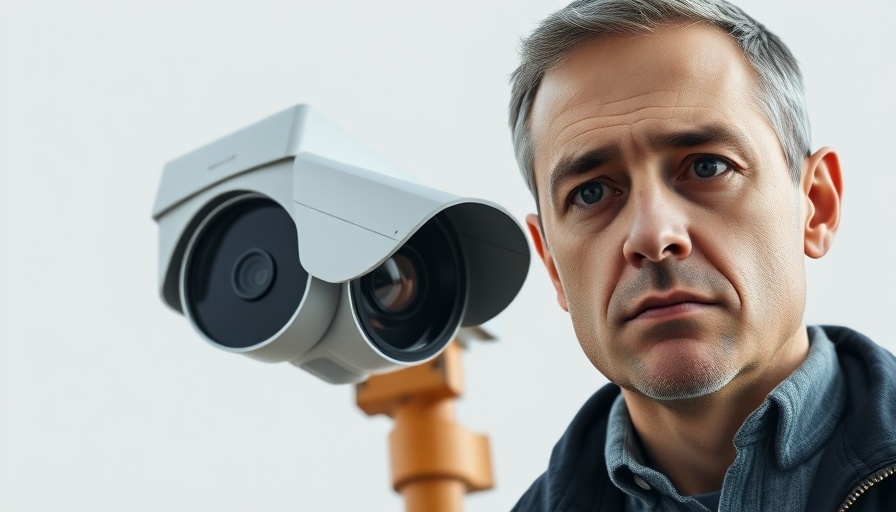
The Debate Over Traffic Cameras: Balancing Safety and Privacy
The recent discussion surrounding the use of traffic cameras in the U.S. Congress highlights an ongoing debate between public safety measures and individual rights. As technology advances and automated systems become more prevalent in law enforcement, lawmakers are grappling with the implications of these tools on civil liberties. Representative Andrew Clyde raised significant concerns regarding the presumption of guilt that automated traffic enforcement systems may impose on individuals, arguing that this violates a core principle of the legal system: innocent until proven guilty.
In 'Andrew Clyde: Use Of Some Traffic Cameras 'Violates The Basic Foundation Of Our Legal System', the discussion dives into the delicate balance between safety and constitutional rights, exploring key insights that prompted a deeper analysis.
Historical Context: The Rise of Automated Enforcement
The adoption of traffic cameras has accelerated over the last decade, with many cities introducing them to reduce traffic violations and enhance road safety. By employing technologies like automated license plate readers and image processing software, authorities can issue tickets for red light violations and speeding, sometimes without the need for direct law enforcement involvement. These systems are credited with reducing traffic fatalities and accidents but have also sparked agitation among civil liberties advocates.
In fact, as of 2023, statistics from the National Highway Traffic Safety Administration indicated over 12,000 deaths due to speed-related crashes, urging many jurisdictions to utilize traffic cameras as a safety measure. This brings us to a crucial question: Are these cameras effective in improving road safety, or do they erode fundamental legal protections? As Clyde pointed out, several states have even banned these enforcement tools, citing concerns over due process.
Understanding the Arguments: Safety vs. Civil Rights
Supporters of traffic cameras, like Clyde's colleague from South Carolina, argue that these devices deter reckless driving and save lives. They highlight the statistics indicating a steady decline in crashes in areas where traffic enforcement cameras have been deployed. However, critics argue that relying solely on technology might bring about erroneous citations, as evidenced in a 2014 Chicago Tribune investigation where thousands of drivers were wrongly fined due to system glitches.
For many, the presence of these cameras creates a chilling effect on individual liberties. Critics believe that such systems can often presumptively label vehicle owners as guilty, potentially penalizing individuals without verified human intervention. This scenario raises considerable alarm regarding privacy rights and the risks of automated policing mechanisms.
Current Legislative Developments: A Crucial Amendment
In the latest Congress session, lawmakers considered an amendment to prohibit federal funds for the purchase and installation of automated traffic enforcement cameras. Clyde's amendment aims to ensure that local jurisdictions retain the power to implement traffic cameras if they choose, using their own budget rather than federal support. This proposal underscores a dynamic public policy challenge—how to balance the needs for safety against the imperatives of due process and civil liberties.
Future Implications: A Shift Towards Legislative Scrutiny?
The ongoing discussions around traffic cameras may signal a need for increased legislative scrutiny on surveillance technologies as they proliferate in various aspects of civil governance. As citizens grow more aware of the implications of automated systems, lawmakers may face mounting pressure to clarify where the lines should be drawn in ensuring both public safety and the protection of constitutional rights. Moving forward, the resolution of these issues will likely require detailed studies and careful consideration of the impact on communities.
What This Means for Citizens and Local Policymakers
For average citizens, understanding the implications of traffic cameras goes beyond safety or violation—it concerns privacy, due process, and the overall integrity of American democracy. As states navigate these complex waters, it’s essential to remain vigilant about how new technologies are implemented and regulated. Public advocacy and informed local policymaking will play crucial roles in shaping a future where both safety and civil rights are championed.
Ultimately, debates such as the current one around traffic cameras serve as reminders of the tightrope walked between government surveillance and personal liberties—a balance that is as critical as it is delicate.
 Add Element
Add Element  Add Row
Add Row 



Write A Comment